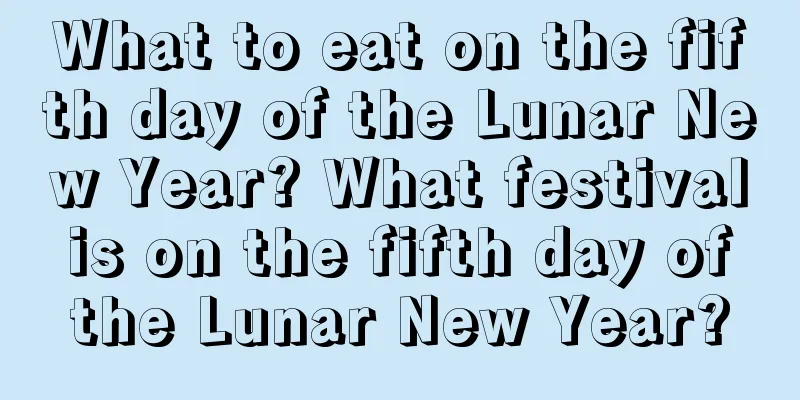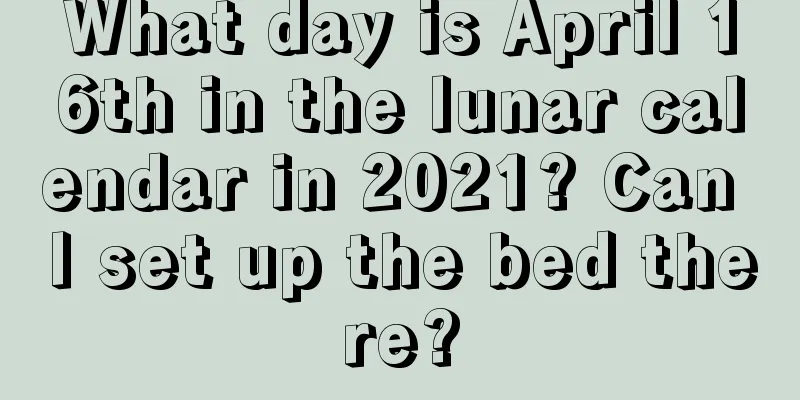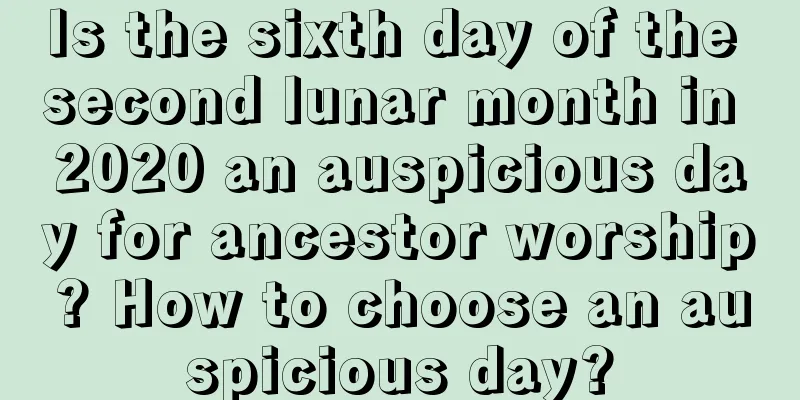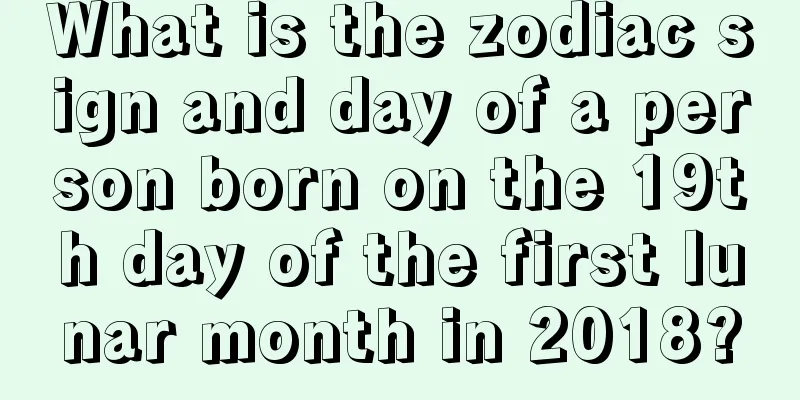How much do you know about the differences between the Spring Festival and New Year’s Eve?
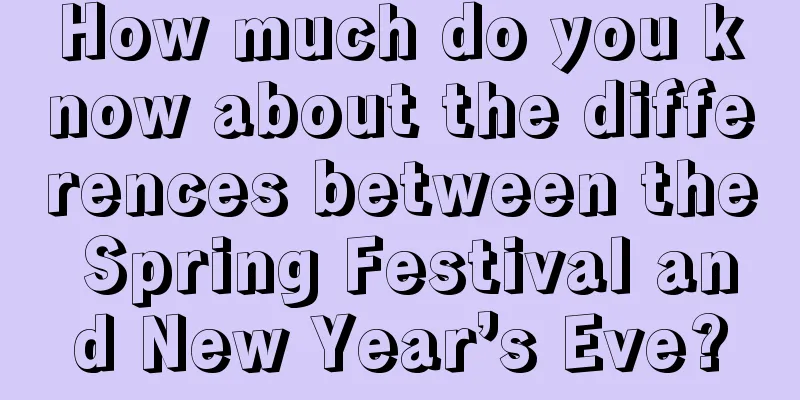
|
Introduction: The Spring Festival and New Year's Eve are closely related festivals, but there are still differences between the two, and the Spring Festival and New Year's Eve cannot be confused. New Year's Eve is the last day of the lunar year, and the Spring Festival is the first day of the lunar new year. Are there any essential differences between the Spring Festival and New Year's Eve? Let’s read the following article for specific details! Mr. Shui Mo has carefully sorted out many customs and some precautions about New Year’s Eve. If you want to know more exciting content, please go to Mr. Shui Mo’s New Year’s Eve special topic to see more! Simply put, the broad definition of the Spring Festival includes Chinese New Year and New Year's Eve; Chinese New Year, New Year's Eve and New Year's Eve are all on the same day, and New Year's Eve specifically refers to the night of New Year's Eve, which is New Year's Eve. The Spring Festival in a specific sense refers to the first day of the Lunar New Year. According to relevant information, New Year's Eve is one of the most important traditional festivals in my country. It refers to the last night of the lunar year, that is, the night before the Spring Festival. Because it often falls on the 30th or 29th day of the twelfth lunar month in the lunar calendar, this day is also called New Year's Eve. The last day of the year is called "Sui Chu" and the night of that day is called "New Year's Eve". On New Year’s Eve, people often stay up all night, which is called Shousui. Su Shi has a poem "Keeping the New Year's Eve": "Children force themselves not to sleep, and stay up all night to have fun." On New Year's Eve, not only do the houses have to be cleaned tidy, but people also put up door gods, spring couplets, new year pictures, and hang door cages. People also change into new clothes with festive colors and patterns. The Spring Festival, also known as the Lunar New Year, is commonly known as the Chinese New Year. The Spring Festival, commonly known as the "New Year's Festival", is the most important traditional festival of the Chinese nation. Since the first year of Emperor Wu of Han's Taichu reign, the first day of the first lunar month of the summer year (lunar calendar) has been regarded as the "beginning of the year" (i.e. "year"), and the date of the New Year's Festival has been fixed and has continued to this day. The New Year’s Day was called “New Year’s Day” in ancient times. After the Revolution of 1911, the Gregorian calendar (solar calendar) was adopted to count years, and January 1 of the Gregorian calendar was called "New Year's Day", and the first day of the first lunar month was called "Spring Festival". Seasonal festivals are also called “traditional festivals”. They have a long history and are widely spread, and are extremely popular, mass, and even national in nature. The traditional, folk, real "New Year" starts from the La Festival on the eighth day of the twelfth lunar month or the Kitchen God Festival on the twenty-third or twenty-fourth day of the twelfth lunar month, and ends on the fifteenth day of the first lunar month, with "The Second Day of the Second Month of the Second Month of the Dragon Raising its Head", with New Year's Eve and the first day of the first lunar month as the climax. Celebrating the New Year has a long history, originating from the worship of gods and ancestors at the beginning and end of the year during the Shang Dynasty. During the Chinese New Year, the Han Chinese and many ethnic minorities in China hold various activities to celebrate. The main contents of these activities are to worship gods and Buddhas, pay tribute to ancestors, get rid of the old and welcome the new, welcome the new year and pray for a good harvest. The activities are rich and colorful, with strong national characteristics. Because the Spring Festival and the New Year are closely connected, and due to the needs of the times, people gradually combined these two traditional festivals into one. In terms of time, the Chinese New Year is the last day of the year, which is the end of the year. The Spring Festival is the beginning of the year, and the first day of the New Year is the first day of spring in the lunar calendar, so it is called the Spring Festival, which tells people that from this day on, spring has arrived and the new year has begun. In the past, people called this time the Chinese New Year, which is "New Year's Eve". With the introduction of the Gregorian calendar, the "New Year's Day" on the first day of the first lunar month was changed to a synonym for the Gregorian New Year. In addition, after the 1960s, political factors such as "breaking the old and establishing the new" and "breaking superstition" gradually faded the significance of the year. In recent years, the words "New Year's Eve" and "Spring Festival" have been printed on some desk calendars, wall calendars, and calendars. However, in public media and propaganda, the New Year and the Spring Festival are confused. I really don’t know whether the Chinese traditional festival “New Year”, which has been passed down for thousands of years, will be replaced by the “Spring Festival”. It’s hard to say. Summary: The above article content is what the editor wants to introduce to readers about the analysis of the differences between the Spring Festival and New Year’s Eve. I hope everyone can understand it and don’t misunderstand our most important festival! |
<<: The Origin of Eating a Reunion Dinner on New Year's Eve
Recommend
Is it okay to get engaged on June 29th of the lunar calendar in 2022? Can I get engaged on the same day?
The pros and cons of choosing to get engaged at di...
Is it a good idea to pick up the car on October 29th of the lunar calendar in 2017?
A gust of cold wind blows by, and we enter the ea...
Is the tenth day of the sixth lunar month in 2019 a good date to open a new store?
The sixth lunar month has already entered summer ...
The location of the God of Wealth on September 21, 2020
An overview of the God of Wealth's location o...
Is April 19th of the lunar calendar 2017 a good day to move into new house?
Introduction: Moving is the beginning of a new lif...
What are the auspicious days for starting work in May of the lunar calendar in 2019?
Anyone who can read the almanac knows that everyth...
Is it a good idea to pick up a new car on July 13th of the lunar calendar in 2018?
The seventh month of the lunar calendar is full o...
Astrological analysis of the fate of people born in the year of the monkey during the solar term of the Great Heat
There are certain opinions about whether the fate ...
What will the second day of September in the lunar calendar be like in 2022? Is it suitable for renovation and groundbreaking?
What will the second day of September in the lunar...
A detailed analysis of the physiological destiny of people born on January 1st, the New Year's Day!
Introduction: The numerology of people born on New...
Is it auspicious to repair graves on the seventh day of the twelfth lunar month on New Year's Day 2019? Will highways be free on New Year's Day 2020?
Introduction: It is also necessary to choose an au...
When is the best time to get married in December 2021? Check the auspicious date for marriage in December 2021
The twelfth lunar month is here, and the new year ...
Is the 24th day of the twelfth lunar month in 2020 a lucky day for breaking ground in the south? What day is February 5, 2021?
Introduction: Generally, it is necessary to choose...
Is it appropriate to hold Anmen Square on the 28th day of the twelfth lunar month in 2021? What's the omen for this day?
The twelfth lunar month is at the end of the year,...
Query the position of the God of Happiness on the 25th day of the fourth lunar month in 2018
The beauty of April on earth has faded, and the p...

